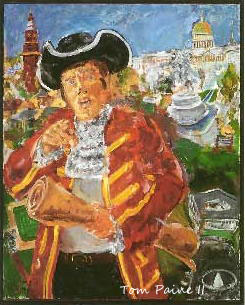Submitted to the Select Committee on Deficit Reduction, Oct. 26, 2011
I urge the committee to consider, and to prepare for the full consideration of Congress, the option of paying automatic social security (and perhaps other) entitlement dues now held as Treasuries with new issues of United States (versus Federal Reserve) notes -- not as a rule going forward, but merely for a deficit-trimming trial, limited to a few hundred billion dollars. Thereby, not only will these dues will be paid, but also that debt will be retired, instead of rolled over as the Treasuries mature, with interest rates reset, and dealer fees et alia added. Without impairing private contracts, this action would painlessly mitigate a fiscal crisis commensurate with those imposed by full scale war.
Given the direct and dramatic savings, the public surely deserves at least an explicit statement of the countervailing reasons against such a delimited "public money option" -- if any exist. In the entire congressional record, I find only the puffed and unexamined presumption that:
(a) inexpert, office-seeking politicians absolutely cannot be trusted to control themselves when printing money to spend at face value for the public good, even though each monetary issue be debated and approved, as an inflationary flat-tax; whereas,
(b) private bankers appointed to the FED -- acting largely in secret and independently, albeit with conflicting interests [1] -- can be trusted to print all the nation's currency, for purely private banks to leverage and lend, at interest rates and on terms that they are largely free to define and market anywhere, to whomever they choose. [2]
This presumption would now seem squelched by the open vigor of the current fiscal debate in Congress, made necessary by the prolonged, pervasive, elementary, selfish and incestuous idiocy of the supposedly expert and self-disciplined banking community, in causing the current crisis. But in any case, the presumption does not apply to the proposed public money option, because it is limited to automatic, mandated entitlement payouts, and further limited to the trial or "emergency" issuance of just a few hundred billion new dollars. Moreover, given this limitation, neither the FED's authority over monetary policy (i.e. its control over the quantity of money in circulation) is objectionably infringed, nor is any intolerable inflationary effect implied, since the FED would be free to withdraw equal sums from circulation, should it so choose, by reducing its presently bloated balance sheet. [3]
There is a further benefit from this limited public money option, which I deem of even greater value than the direct fiscal relief that it assures. Is it not compelling that the public should -- and only by such an actual trial can -- re-educate itself as to the extraordinary nature of its fiat paper-money power, and of the controlling profits so long gifted to, if not usurped by, a monopoly of private banking interests? Today, popular newspapers, unpopular sovereign credit rating rationales, and obscure academic banking papers, uniformly tell the public that the government has already printed trillions of new dollars, and could print more. In reality, the government has not printed a single new dollar note since the civil war, [4] when Congress, after due debate, approved Abraham Lincoln's request for the limited issues of "the true greenback" that saved the nation from bankruptcy and defeat. [5]
[1] See, e.g.: Federal Reserve Directors: A Study Of Corporate And Banking Influence , House Committee On Banking, Currency And Housing, August 1976.
[2] See, e.g., Money Facts , House Committee on Banking and Currency , Sept. 21, 1964, Facts 4, 69:
4. Why was the banking system given the right to create money?
Once the money and credit is created someone must decide whom to give the money and for what purposes. This the banks do. And bank earnings are the return for wise and proper placing of the money supply.
69. If the government can issue bonds, why can't it issue money to avoid the debt and interest?
It has long been one of the political facts of life that private banks must be allowed to create the money, [except coins]" Abraham Lincoln set off a political furor when he insisted upon having the Government issue $346 million in money (the so-called "greenbacks") instead of issuing interest-bearing bonds and paying interest on the money.
[3] As Alan Greenspan observed in a June 30, 2011 CNBC interview: "If it weren't for the psychological effects, we could probably take a trillion dollars off the balance sheet of the Federal Reserve, it would essentially be removing the double counting that is going on."
[4] There have been a few reissues of some of these original greenbacks, most recently by President Kennedy, in $2 denominations.
[5] The success of Lincoln's greenbacks rendered ridiculous the prior ridicule of New York bankers, who overplayed their hand by refusing to buy the then losing government's bonds, except at a 36% discount. See: History Of The Legal Tender Paper Money Issued During The Great Rebellion , Senate Sub-Committee of Ways and Means, 1869. See also: The True Greenback, 1868, by Alexander Campbell, "father of the Greenback Party"; and, in a lighter vein, Treasured Notes, by the author.





